
GONE GIRL is in theaters across the country as of today. Based on a mega-bestselling novel by Gillian Flynn, the movie is even more interesting to avid filmgoers as the latest David Fincher film. Fincher’s most frequent job title is director — he works from scripts written by a variety of talented writers and enlists world-class cinematographers whose contributions should never be backgrounded. That said, there’s an authorship to a David Fincher film that is increasingly rare at the big-studio level. Fincher is a distinctive stylist and a master of atmospherics, with a canny eye for casting and a deft ear for music. Thematically, Fincher’s feature films are borderline nihilistic, which is a fascinating counterpoint to his side career as a successful director of commercials and music videos. It’s intriguing to see such captivating visuals matched to a worldview that is sardonic at best.
Before seeing GONE GIRL, I thought I’d repost my thoughts on his previous three films (my archives don’t go back further than 2007.) Here’s my take on THE SOCIAL NETWORK.
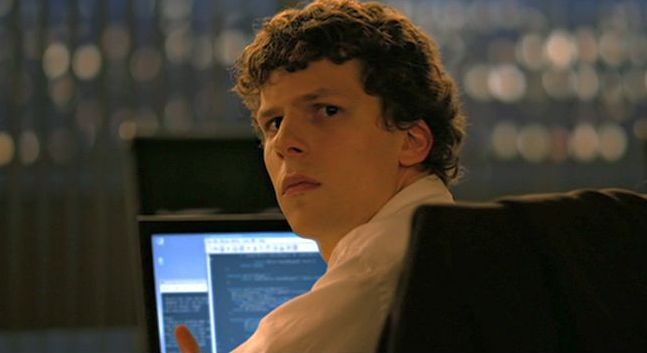
From the time THE SOCIAL NETWORK was announced as a film, straight through until the moment I finished watching it for the first time, I couldn’t help thinking of my old friend Tom from Myspace.
Well, we used to be friends. We’re not friends anymore. I haven’t been to his site in months. Neither have most people I know. We’re all on Facebook now. THE SOCIAL NETWORK is an entire movie about Facebook. It briefly name-checks Myspace, and its even more prehistoric predecessor, Friendster, but that’s all the credit Tom gets.
I wonder how he feels about that. A few years ago he was at the top of the world. He was friends with celebrities and rock stars. He even got to cameo in FUNNY PEOPLE with Adam Sandler! Tom managed to get into the movies there for a second, but no one bothered to make movies about him. Poor Tom. How he must hate that little punk who started Facebook.
He’s apparently not the only one.
THE SOCIAL NETWORK is told in an interesting way: It begins with Facebook creator Mark Zuckerberg (played by Jesse Eisenberg) as an undergraduate at Harvard, creating the nascent website initially as a revenge move against the girl who dumped him (played by Rooney Mara). Then the narrative fractures, fast-forwarding to two concurrent legal proceedings: Zuckerberg getting sued by Cameron and Tyler Winklevoss (both played by Armie Hammer), who claim that he stole the idea of Facebook from them, and also by his former best friend, Eduardo Saverin (played by Andrew Garfield), who claims that Zuckerberg shut him out of what started as a joint venture.

Back in real life, some of the specific details of this cinematic account have been called into question. Writer Aaron Sorkin has been accused of inventing details for dramatic effect, and director David Fincher has been accused of emphasizing certain aspects over others, or even more incorrectly (and briefly) accused of misogyny, just because this happens to be a story that features mostly male characters. This is the occupational hazard that filmmakers face when making a movie “based on a true story,” particularly one where all of the principal figures are still alive and in full command of their own subjective memories. At the moment of writing, in this case my own personal opinion is ‘Who cares?’ As long as the movie is as good as this one, the details are less important than a story well told. Personally, I’d be proud to see a movie this good having been made using my life as inspiration, even if I were cast in a less than adoring light. I honestly don’t think that anyone comes out of this movie looking any worse than they already present themselves publicly, except arguably the Facebook website itself. But I’ll get to that in a moment.
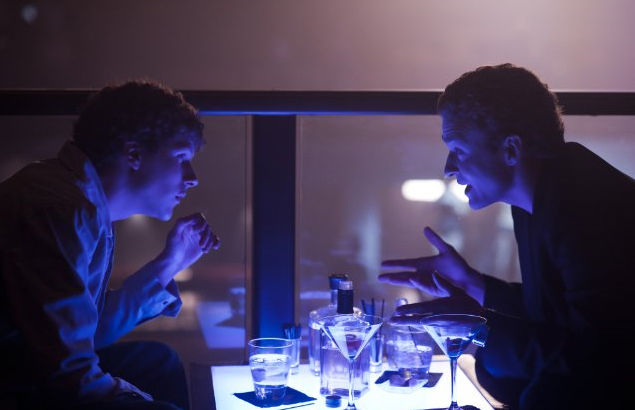
In praising
THE SOCIAL NETWORK, I’m late to the party. There’s not much left to say that hasn’t been said in more florid prose by more prominent writers. I will remind my longtime readers (are there any?) that
I was initially measured in my faith in the possibilities of this project. I wasn’t sure that it was the most cinema-friendly material, and I suffer from a major disdain for co-star Justin Timberlake (as much as it is possible to have disdain for a relatively innocuous pop singer who I’ve never met.) But I trusted in the talents of David Fincher, who is one of my favorite directors, and the reward for that trust was an unusual, compelling, and fascinating movie that directly addresses a major element of modern cultural psychology.

Fincher brings a dark, dingy, even ominous palette to material that any other director would surely shoot flatly and brightly. In the opening scene, which takes place in a college bar, this directorial choice feels naturalistic – it looks more like the inside of a bar than comparable scenes in any other movie I can remember. But then, when Zuckerberg steps outside of the bar, bunches up his GAP sweatshirt, and storms all the way across campus to his dorm, the moody (and brilliant) score by Trent Reznor and Atticus Ross kicks in and the look of the movie doesn’t let up, and it becomes clear that this is a college movie that doesn’t look or sound like any college movie ever made. Fincher is working again here with Jeff Cronenweth, his cinematographer from FIGHT CLUB, and together they bring the visual subversion and darkness from that earlier work to a seemingly unlikely match of story.

Aaron Sorkin is not typically a writer whose work I follow – he’s obviously an excellent writer but his characters tend to be too eloquent and hyper-articulate, and I’m an Eastwood man. I believe that you can say more with less. Here, however, the dichotomy between Sorkin’s verbose scripting and Fincher’s typical approach somehow yields brilliant results. It’s like scallops wrapped in bacon at a steakhouse. It sounds like an ill fit, but just take a taste.

Think of the scene where Eduardo Saverin’s unbalanced girlfriend (played by Brenda Song) sets a fire in his room – it’s the kind of broad comedy you might typically expect in a Sorkin production, with screwball dialogue firing in all directions, but Fincher shoots it like a Japanese horror movie. He also gets the most out of the eerie Aryanness of the Winklevoss twins, who are actually surprisingly likable in the movie, but then again think back to that scene where they’re competing in a crew race in England. Think of the crazed, irregular speed at which Fincher shoots it, and of course, think of the hyperactive take on Grieg’s
In The Hall Of The Mountain King on Reznor and Ross’s musical accompaniment. Stanley Kubrick would have approved.

The cast is uniformly excellent. Jesse Eisenberg, of course, is receiving all of the complimentary ink he deserves as the nerd-savant entrepreneur who really did change the way people interact right now. I’ve seen Eisenberg in a bunch of movies both good and bad –
RODGER DODGER,
THE VILLAGE,
CURSED,
ADVENTURELAND,
ZOMBIELAND – and he’s been good in all of them, but always in a much warmer way. Now, for
THE SOCIAL NETWORK, he crinkles up his eyes and brings something new – instead of an emotional openness, there’s an inscrutability. He seems like an alien in the body of a college student, trying (and failing) to figure human beings out.

In all the raves over this movie, I’m not seeing nearly enough praise going the way of Rashida Jones, in the fictionalized role of an assistant to Zuckerberg’s legal counsel. As she does in every single guy-comedy she’s been cast in over the last few years (and there have been many of them), she brings a calm, cool, cutting, sarcastic groundedness to any room full of badly-behaving dudes. In THE SOCIAL NETWORK, Rashida Jones plays the only real adult – I don’t count all the lawyers and such – and her character brings a necessary and sobering perspective (while simultaneously demolishing those claims of the movie’s misogyny alluded to earlier), particularly at the movie’s end, where her unheeded parting advice to Zuckerberg feeds directly into that haunting final scene.
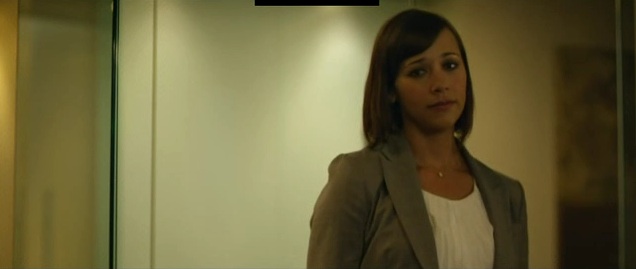
Andrew Garfield has been cast as the next Spider-Man, and it’s hard not to watch
THE SOCIAL NETWORK through that prism. His work here does bode well for that movie, safe to say. He plays the loyal and supportive best friend who is iced out and betrayed, and he’s never less than likable throughout. He really is the human heart of the movie, since Eisenberg’s character is by nature unable to provide that. And there’s also Rooney Mara, as the girl who got away (or ran screaming) – she only has a couple scenes, but like Garfield, she brings a recognizable relatability to her role that the movie and the main character need. She’ll be working with Fincher again on his upcoming adaptation of
THE GIRL WITH THE DRAGON TATTOO – on the basis of this evidence, it’s good casting.
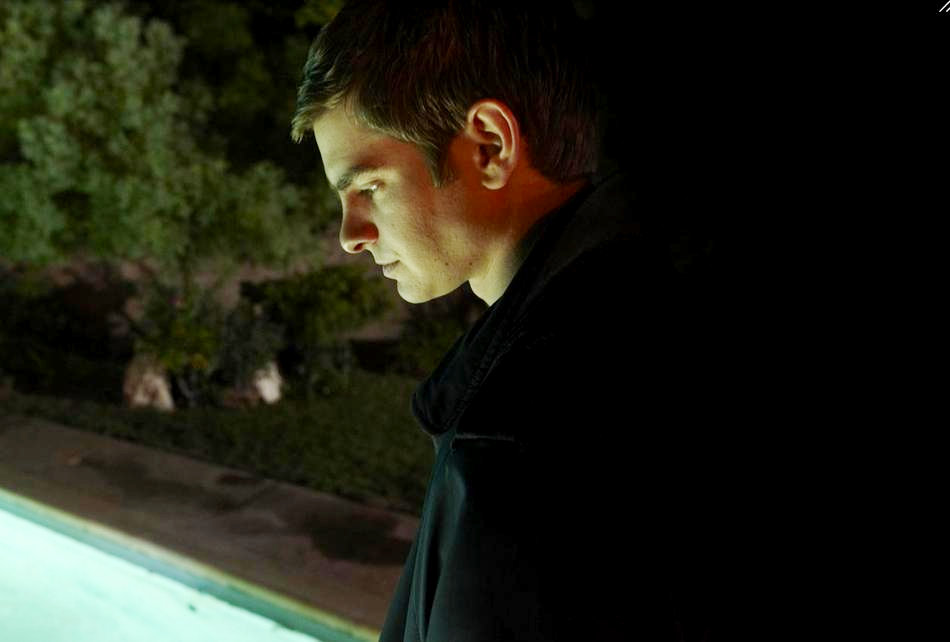
By contrast, Armie Hammer’s double-character is set up narratively as the movie’s antagonist, the stereotypical blond jock from the college movie. Hammer does bring a creepy dual-Spader WASP-ishness to the role, but also has the kind of charisma that makes you see his characters’ point of view. Max Minghella is also good as Divya Narendra, the cohort of the Winklevoss twins. I would’ve sworn he was Indian. Is that wrong to admit? I have more unpopular opinions than that, such as:
Yeah, I still can’t stand Justin Timberlake. In THE SOCIAL NETWORK, the multi-hyphenated entertainer plays Sean Parker, the co-founder of Napster and fast-talking opportunist who takes Zuckerberg under his shady wing. The main reason for that dislike is that we’re closing in on two decades where he’s been in the public eye, and I have yet to see [what I discern as] a genuine human emotion from the guy. To me, he represents callow and shallow over the past decade and in the year 2010. You can call it masculine jealousy, but I’m creeped out by seeing sex-symbol status awarded to a guy whose main career inspiration has always been Michael Jackson. He’s all “entertainer,” and that doesn’t work for me if you don’t have the quality of music Michael Jackson did. It’s certainly a question of personal taste, but I don’t agree that his attempts at music (and more recently, at comedy) are remotely as good or as interesting or as knowing as his recent press would argue. I’d still like to be proven wrong, but it hasn’t happened yet.

All of that being said, however: He’s terrific in THE SOCIAL NETWORK, and for all of the above reasons. He’s cast perfectly for the character he’s playing, and while that may sound like a back-handed compliment, he delivers the needed effort and effect. The way Timberlake works in the movie is the way he works in life: Eisenberg’s character is taken in by his flash and dazzle and energy and confidence, and Garfield’s character sees right through it all and doesn’t trust it for a minute. (Sound like someone we know?) Late in the movie, when Timberlake is called upon to deliver a broken, emotional performance, the strain shows – but just as it should, since his character up until then was used to living without consequence and getting out of the trouble he kept finding. When it finally catches up with him, he’s struggling to adjust. Timberlake plays it perfectly. My only concern is that producers, seeing how good he is in THE SOCIAL NETWORK, will decide that Justin Timberlake can carry a movie on his own. Worse, they will mistakenly assume that he can carry an action movie. (Can you imagine?) But that’s an issue for the future. In the present, Justin Timberlake is just another effective element in a fairly flawless film.
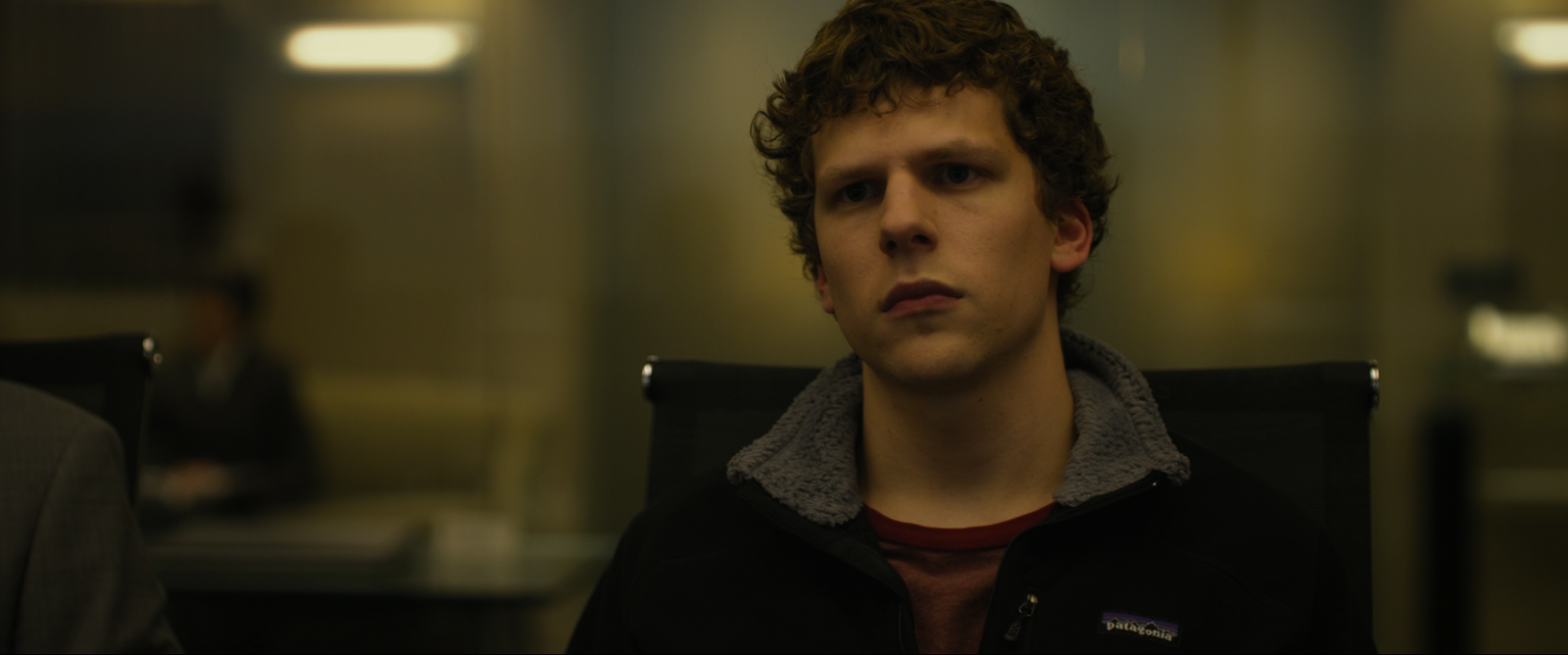
The last question that THE SOCIAL NETWORK raises is, “Where does it leave us with Facebook?”
For one thing, I wonder how people who aren’t on Facebook will look at this movie. Do they get it? Do they understand why that final image is so haunting and so true? THE SOCIAL NETWORK has everything to do with the way that, for all of its virtues, the internet has fractured and even obstructed real-life social interaction – we connect with each other even as we isolate – and Facebook is the ultimate example of that shift. For me, Facebook is a means to an end. It will help me bring the review you’re reading to more people than might otherwise have seen it. On a personal level, I have been able to reconnect (or at least, to trade emails) with many people who I have known and missed over the years, and I’m thankful for that. But that’s me emphasizing the upside. As we all know, there’s just as much empty noise on Facebook as legitimate interaction. Some of the same less-positive aspects of our social lives are just as present on Facebook – we’ve just moved them from the streets to the internet. (That’s the name of my next rap album, by the way.)

Is Facebook bringing us closer together, or driving us apart in some ways? Does the fact that Facebook was invented by a young man who may or may not have the ability to maintain healthy, positive friendships in his own life bring into question the idea that his invention has anything to teach us about friendships? Is there truth in Facebook? Forget the truth in the circumstances of its invention – I’m talking about whether or not using Facebook can help us get closer to truth . Has Facebook really become part of our lives, or does it exist strangely separate from them? And most importantly: Is Tom from Myspace on Facebook? And if he is, would he be “friends” with Mark Zuckerberg? Or me? (I’m only half kidding, by the way.) These are some of the questions that THE SOCIAL NETWORK invites us to ask, and these questions are the reason why it is the movie of the moment.

Jon Abrams is a New York-based writer, cartoonist, and committed cinemaniac whose complete work and credits can be found at his site, Demon’s Resume. You can contact him on Twitter as @JonZilla___.
Latest posts by Jon Abrams
(see all)
Tags: Aaron Sorkin, Andrew Garfield, armie hammer, Atticus Ross, Brenda Song, David Fincher, Jeff Cronenweth, Jesse Eisenberg, Justin Timberlake, Mark Zuckerberg, Rashida Jones, Rooney Mara, Trent Reznor

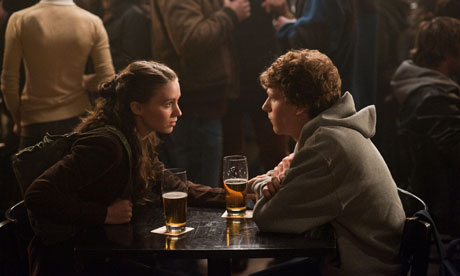




















No Comments